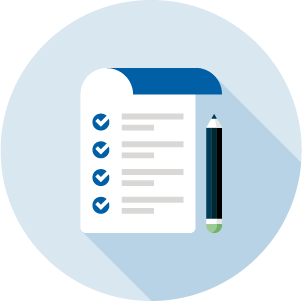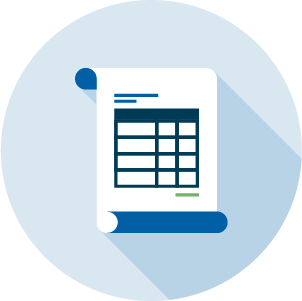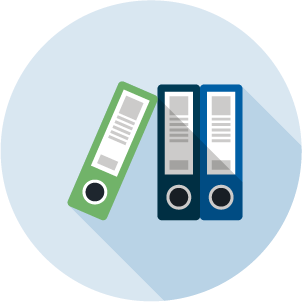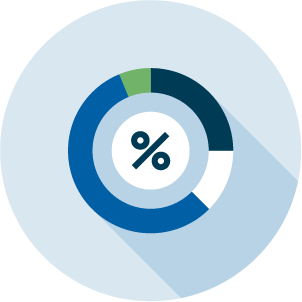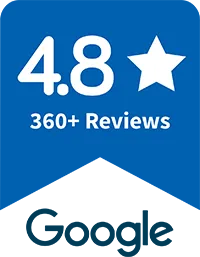Bi-weekly Calculator
A bi-weekly mortgage calculator is an online tool that helps homeowners estimate their payments when they opt to pay every two weeks instead of the traditional monthly schedule. This approach offers a smart and efficient way to manage your mortgage. By making bi-weekly payments, you can accelerate your loan repayment, reduce overall interest costs, and alleviate long-term financial stress.
Benefits of Bi-weekly Payments
Switching to bi-weekly payments has multiple compelling benefits, such as:
-
Pay Off Mortgage Faster
To understand the benefits, you first need to understand, “How bi-weekly mortgage payments work?” In this case, homebuyers make payments every two weeks instead of following the conventional monthly system. Over the course of a year, you end up making 26 half-payments instead of the usual 12 full ones. This means an extra full payment is applied toward your principal balance annually. With more frequent payments, the principal reduces faster, helping you pay off your mortgage faster—often by several years.
-
Save Money with Bi-Weekly Payments
Besides helping you pay off your mortgage faster, bi-weekly payments can significantly reduce the total interest you pay over the life of your loan. By lowering the outstanding principal more frequently, interest accrues at a slower pace. This reduction in interest can lead to substantial bi-weekly payment savings, especially for long-term loans. Use a mortgage interest savings calculator to estimate the monthly savings on this repayment plan.
-
Smaller and Manageable Payments
Another benefit of bi-weekly payments is that your obligation to pay off your mortgage is divided into smaller and manageable amounts. For homeowners who are going through financial challenges or wish to ease off their budget, mortgage payments get aligned with their income cycles.
-
Builds Home Equity Faster
Often, homeowners have a question- what should they choose from Bi-weekly vs. monthly payments? The answer depends on your financial situation as well as your objective. If your objective is to attain home equity faster and have sound financial conditions, bi-weekly payments are a good choice; otherwise, monthly payments are the appropriate option.
In bi-weekly payments, you make extra payments toward the principal balance, due to which you’re able to pay off your mortgage faster. These accelerated mortgage payments and equity growth are major benefits for homeowners because it provides greater financial flexibility. With increased equity, you can explore options like refinancing your home or borrowing against the equity to improve your overall financial health.
-
Less Financial Stress in Retirement
The faster you pay off your mortgages, the stronger your financial health becomes. With fewer financial obligations, your retirement years become more manageable and less stressful. This converts into peace of mind and offers greater financial security when you grow older.
Is Bi-Weekly Right for Me?
When deciding between bi-weekly vs. monthly payments, it’s essential to weigh the benefits of bi-weekly payments against your financial circumstances. Bi-weekly payments may not suit everyone, so assess these key factors before making the switch. Use a bi-weekly mortgage calculator to estimate potential savings and determine if this option aligns with your financial goals.
Cash Flow and Income Stability
Bi-weekly payments require a stable and consistent income. If your earnings are irregular or insufficient to meet a bi-weekly schedule, sticking to monthly payments may be the better choice. Opt for bi-weekly payments only if you can handle the schedule comfortably without overburdening yourself with financial stress.
Prepayment Penalties
Some lenders impose penalties for early mortgage payoffs. While not all lenders have these terms, it’s crucial to review your mortgage agreement to understand any potential costs. Consult with your lender before switching to a bi-weekly schedule to ensure there are no hidden fees or penalties.
Lender Flexibility
Not every lender offers bi-weekly payment options. Confirm with your lender if this option is available. If not, explore alternative options, such as making additional payments monthly to reduce your principal balance without formally adopting a bi-weekly schedule.
Savings Priorities
Before committing to bi-weekly payments, evaluate other financial priorities. If you have high-interest debt, like credit card bills, it may be more beneficial to focus on those first. Additionally, ensure that increased mortgage payments won’t disrupt critical savings goals, such as building an emergency fund or contributing to retirement accounts.
Long-Term Financial Goals
Bi-weekly payments are ideal if you plan to stay in your home for an extended period. However, if you intend to sell the property in the near future, sticking to monthly payments might make more sense. The potential savings from bi-weekly payments may not justify the change if your stay in the home is short-term.
By carefully considering these aspects, you can determine whether bi-weekly payments align with your financial situation and long-term objectives.
Use Cases
Case 1: John’s Bi-Weekly Payment Strategy for His First Home
John purchases a $350,000 home, putting 10% down & financing the rest of the amount with a 30-year fixed-rate loan at a 7% interest rate. His monthly mortgage payment is $2,095, broken down into $257.50 toward the principal and $1,837.50 for interest in the first payment.
To adopt a bi-weekly payment schedule, John splits his $2,095 monthly payment in half, paying $1,047.50 every two weeks. By doing this consistently over the course of a year, John ends up making 26 half-payments, which is equal to 13 full monthly payments — one extra payment every year.
This additional payment is applied directly to reducing the loan principal, allowing John to save significantly on interest and shorten the loan’s payoff time. Over the life of the loan:
- With monthly payments, John would pay $439,453 in total interest, taking the full 30 years to repay the loan.
- With bi-weekly payments, he reduces his total interest paid to $327,470 and pays off the mortgage in just 23 years.
By switching to bi-weekly payments, John saves over $111,000 in interest and cuts seven years off his loan term. The accelerated mortgage payments not only speed up his journey to homeownership but also improve his long-term financial outlook.
Case 2: Mike & Sara Planning to Reduce Financial Obligations for Retirement with Bi-Weekly Strategy
Mike and Sarah are nearing retirement with a remaining mortgage balance of $200,000, a fixed interest rate of 5%, and 15 years left on their loan. They are considering switching to a bi-weekly payment schedule to reduce their financial obligations before retirement. Using a standard amortization formula, their monthly payment is calculated as approximately $1,582.
By dividing their monthly payment in half, Mike and Sarah will pay $791 every two weeks. Since there are 52 weeks in a year, they make 26 bi-weekly payments, which is equivalent to 13 full monthly payments annually.
Annual payments with monthly schedule: $18,984
Annual payments with bi-weekly schedule: $20,566
The extra payment of $1,582 (one full monthly payment) is applied directly to reducing the loan principal each year.
- With monthly payments, Mike and Sarah would pay approximately $79,662 in total interest over the remaining 15 years.
- With bi-weekly payments: By shortening the loan term to around 11 years, they reduce their total interest paid to about $56,395
Switching to bi-weekly payments allows Mike and Sarah to pay off their loan 4 years earlier and save $23,267 in interest.
By adopting this strategy, the couple ensures they enter retirement with fewer financial obligations, giving them greater peace of mind and financial freedom.
Switching to bi-weekly mortgage payments offers a smart strategy for homeowners looking to save money, build equity, and reduce financial stress. If you need help with bi-weekly payments, speak to our team at Total Mortgage.
Determine mortgage payments for different types of loans, see how to repay your loan much more quickly by making additional monthly payments, estimate how much you can afford to borrow, calculate the income required to qualify for the particular loan.


